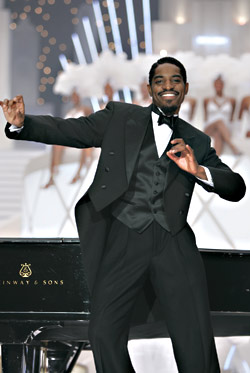Few recent examples of Hollywood pop art have ransacked the bin of history with as much loose energy and invention as Bryan Barber’s movie, set in a 1935 Georgia backwater and invoking a Depression morphed and tickled with hip-hop, digital animation, and movie memories. At the same time, Idlewild has a sober, loving respect for history and the old South, and thereby grants itself a bouncy measure of distinction. It’s also the most substantially conceived movie vehicle hip-hop stars (here, OutKast’s André “André 3000” Benjamin and Antwan “Big Boi” Patton) have ever gotten, which isn’t saying a great deal.
Tinted sepia and dolled up in supreme period duds, Barber’s all-black universe revolves around a bustling nightclub/speakeasy/whorehouse with chicken coops onstage and a seething backstage warren of clutter that never, despite the film’s reputedly tiny budget, feels redundant. The narrative lobs between Benjamin’s pianist Percival, a mortician by day with romance problems, and Patton’s Rooster, a faithless family man who witnesses his boss getting whacked by a rabid hood (Terrence Howard, outacting everybody).
OutKast themselves are a bit of a muddle: Patton, having made a fortune with hip-hop’s standard-operating-procedure supercool introversion, rarely opens up to attempt any acting. Benjamin, stuck with a mopey role, fares better, and carries with him a self-pitying darkness that’s not on the script page. Meanwhile, Idlewild grows more conventional and slack as it rolls on. The gang war we’re promised never coalesces, Percival’s romance (with Paula Patton, no relation to Antwan) takes eons to consummate, and for long stretches, everyone seems to be waiting for someone else to push the oldfangled story over the next edge.
Idlewild certainly boasts racial self- assurance, which owns the caricatures as well as the stereotype busters, and bullishly obviates any potential NAACP objections. (Its regard for women, however, isn’t far above the hip-hop schema of crazy whores and nagging wives.) The film is so cornpone that class and poverty aren’t even issues—crime and decadence are their own reasons to get the hell out of Georgia while the getting is good. MICHAEL ATKINSON




